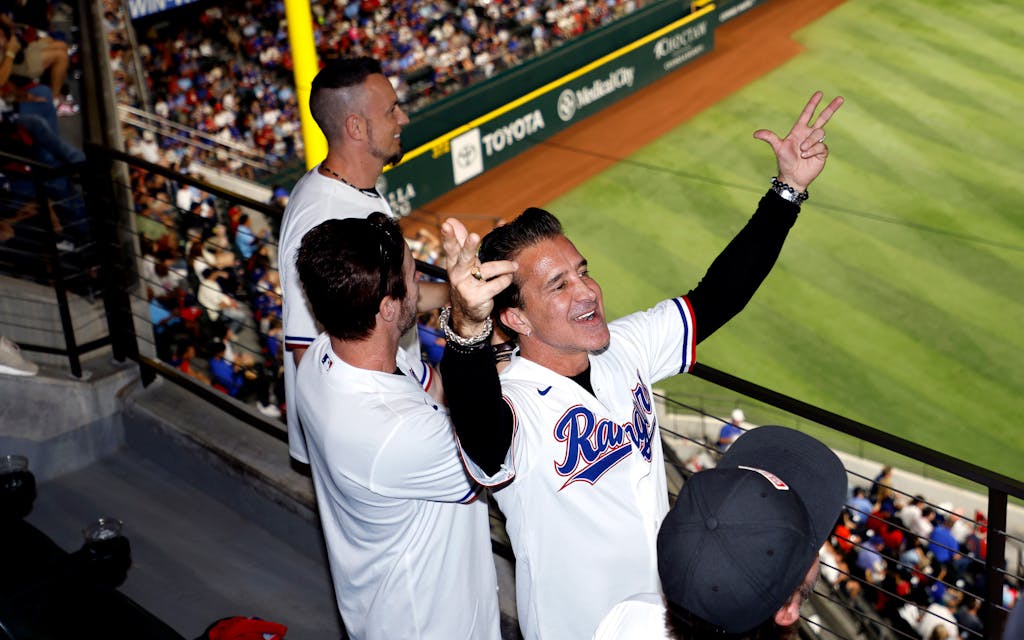How the Texas Rangers Taught Me to Stop Worrying and Love Creed
Creed #Creed

The Texas Rangers are back in the World Series for the first time since 2011 and the third time in franchise history, and with their return to national prominence comes—improbably—a similar revival for one of the more maligned rock bands of the late nineties. Somehow, Creed has returned.
The band’s biggest and most enduring hit, the stadium-rock fist-pumper “Higher,” has, during the Rangers’ pennant run, found the sweet spot on the spectrum between anthem and meme among Rangers fans and players. The average age of the Rangers’ roster is just a smidge over thirty, meaning that most of the team’s players were younger than ten years old when the band was last relevant. Creed, in its initial incarnation, played its last show in 2002 before announcing its dissolution in 2004; when the group reunited in 2009, the music world had largely moved on from Creed’s signature sound of gruff, riff-heavy guitar rock, and after launching a reunion tour in Houston that fall, the band began discounting its ticket prices. It released one additional album, and then its members went their separate ways until 2023, when they announced a nostalgia cruise with other nineties rock acts.
And then the Rangers happened. Since the team began talking about its affinity for the band, Creed’s Spotify streams have jumped—up 175 percent in the first week after Rangers players shared that they play “Higher” before games. Minnesota Vikings quarterback Kirk Cousins quickly picked up the meme, playing the song before the NFL team’s games (the Vikings are undefeated since Creed became a locker-room fixture). On Saturday, Creed released on streaming services a seven-song compilation called Stadium Anthems, the title appearing in a logo that bears more than a passing resemblance to the Rangers’ logo. The band popped into Globe Life Field for game three of the American League Championship Series to lead fans in a sing-along to its signature hit. And through it all, I’ve discovered something: Creed, it turns out, kinda slaps?
When Creed burst onto the scene in 1999 with “Higher,” I was a teenage punk rocker living in the Rio Grande Valley, and Creed was ubiquitous. I worked at the Sam Goody record store at La Plaza Mall, in McAllen, and the band’s album Human Clay was easily the best-selling English-language release at the store.
I hated it. The band sounded epic, but empty—all crescendos, no lows, with lyrics so saccharine I got a toothache hearing them bleed over from the window of a passing car. The chorus to “Higher” involves front man Scott Stapp singing the words “Can you take me higher? / To a place where blind men see,” which makes no sense and means nothing (and was, I decided, low-key insulting to blind people).
Stapp sang like Eddie Vedder and the band thumped like Soundgarden, but without any of the subversion that those creators used to balance out the inherent pomposity of their bombastic rock and roll stereotypes. Pearl Jam’s songs asked listeners who wanted to rock out to meaty riffs to identify with women and marginalized characters; Chris Cornell had enough self-awareness to poke fun at the rock star–as–messiah image by giving his band’s songs names like “Jesus Christ Pose.” Stapp, meanwhile, belted out lines like “The world is headed for mutiny / When all we want is unity” with a straight face, and he dressed like Moses cosplaying as a pirate who’d just discovered a treasure chest full of leather pants. The grunge acts Creed aped sought to subvert rock tropes; Stapp embraced them. It’s still impossible to imagine him using the word “irony” unless he was grasping for an adjective to describe Iron Man.
But also: Who cares about any of that now? The dream of the nineties is long dead, and so is the era when competing approaches to guitar rock mattered to anyone. Hating on Creed is as juvenile as earnestly singing lyrics like “I feel angry, I feel helpless”—and there’s no longer a massive throng of fans crowding the band’s shows at the Rio Grande Valley Livestock Show Grounds for me to resent because they aren’t listening to Fugazi instead. These days, it’s all just rock and roll.
Hearing “Higher” sung at Rangers home games during the team’s seven-game ALCS victory over the Houston Astros also helped me understand something else: Creed’s guilelessness is an asset, not a hindrance. The band’s songs don’t have the subversive artistry of their grunge predecessors, but sometimes that’s not what you’re after. Sometimes, you want to put one hand over your jersey-clad heart, raise your other fist to the sky, and sing along to a hook that’s big enough to hold 40,000 other voices.
The importance of poetic rock and roll lyrics has always been overstated by snobs, which I’ll grudgingly admit I was in my Creed-hating youth; rock poetry is an art form whose most meaningful lyric is still “A wop-bop-a-loo-bop, a lop-bam-bom.” The question “Can you take me higher? / To a place with golden streets,” it turns out, means anything, depending on context. If you’re annoyed at the long-haired lead singer in leather pants for not being a member of the Afghan Whigs, then sure, it’s dopey; if you’re listening to a stadium full of Rangers fans united in a haze of team spirit and nostalgia, then the sentiment changes. What if they can take us higher, and the real place with golden streets is just the friends we made along the way?

 Members of Creed sing during Game 3 of the ALCS between the Houston Astros and the Texas Rangers in Arlington on October 18, 2023.Ron Jenkins/MLB Photos via Getty
Members of Creed sing during Game 3 of the ALCS between the Houston Astros and the Texas Rangers in Arlington on October 18, 2023.Ron Jenkins/MLB Photos via Getty
Two decades ago, I resented Creed for stripping the meaning from the rock music I loved and replacing it with what felt like pandering and crowd-pleasing. (In an interview I read when I worked at the mall in McAllen, a band member defensively responded to a question about the similarity to Pearl Jam by saying that Creed, at least, remembered to include hooks in its songs—a harsh but fair dismissal of midperiod Pearl Jam.) But what the Rangers have helped me realize is that sometimes, it’s nice to lose yourself in a crowd of 40,000 fans all going nuts over their World Series–bound team and singing the same song.
All of the battles over the soul of rock and roll have been fought, and it turns out the winner was Post Malone. When I hear Creed now, absent the context of an ideological struggle that seemed so important when I was a teenager, I just hear some catchy songs with chunky guitars, and I’m not mad about it.
I wouldn’t say I’m overcome, but I’m ready to embrace it with arms wide open; Creed has taken me higher, and I’m not torn about it. It doesn’t feel like my sacrifice to be moved by “One.” Instead, I’m just singing along—and having a darn good time.